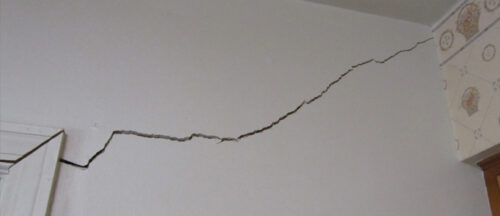Is your house cracking up?
A long, spidery vein is inching its way across the dining room wall. It seems to be spreading even as you stare at it! You’re sure it wasn’t there yesterday… So what does this mean and how can it be fixed?
Don’t panic.
A crack in the wall doesn’t necessarily mean a major structural problem and more often than not, requires only cosmetic attention.
But what causes the cracking and when should you call a professional?
Here are some of the main causes of cracking –
1. Ground movement/changing environment
The foundations of your house are the actual soil and rock material which your house is built on. Dry soil has a considerable impact on home structures, causing cracking and movement in brickwork, internal plasterwork or in tiled areas such as the shower or kitchen splashback. Other issues you might notice include creaking floorboards, shifty doorways and sticky windows. Up to almost 90% of all cracking in houses is due to changing water content in reactive soils and subsequent ground movement.
Some of the main culprits for this might include:
- Trees and shrubs
- Climate
- Surface run off
- Garden Sprinkler systems
- Uneven settlement
- Excessive vibration (heavy traffic, earthquakes, significant earthworks)
2. Age
All buildings settle when they are first constructed but provided the footing/slab design is OK then settling shouldn’t be a major concern. However if the bracing and support in the formwork during construction isn’t sufficient, it can result in concrete movement, and therefore cracking to occur. As buildings age and adjust to environmental conditions there will naturally be some shrinkage and warping which can cause cracks in plasterboard. Cracking in solid plaster is usually associated with the movement of backing material, which will cause the loss of adhesion. This loss of adhesion is generally caused by the use of incompatible coatings with different shrinkage rates and is the most common problem in older plaster work.
3. Poor structural design or workmanship
Unfortunately, poor design or workmanship can play a part in the demise of a building. If in the building design overloading occurs or if there is inadequate support structures in the roof or walls then movement will occur in the building and this will lead to sagging and cracking.
If a builder doesn’t make the right allowances for shrinkage or movement of concrete in pavings and driveways then cracking may occur in those areas also.
If you are at all unsure about the cracks that you’re seeing then contact Jim’s Building Inspections for a professional opinion. We can help you work out the cause and extent of the problem and give you some professional advice on the next steps to take.
Contact us today on 0800 454 654or click here to send through an enquiry.
Conclusion
If your house is showing signs of cracks, it’s essential to assess whether they are minor or indicative of more significant structural issues. Regular inspections and timely repairs can prevent further damage and maintain the integrity of your home. Always consult a professional if you are unsure about the severity of the cracks, ensuring your home stays safe and stable for years to come.
FAQs
Cracks can be caused by settling foundations, moisture fluctuations, temperature changes, or structural issues.
Small, hairline cracks are usually not a concern, but wide cracks or those around windows and doors might indicate a structural issue.
Some foundation cracks are normal due to settling, but larger, horizontal cracks can signal structural damage.
Vertical cracks are often less serious than horizontal cracks but should still be inspected by a professional if they grow over time.
It’s a good idea to inspect your home annually or after significant weather changes for signs of new cracks.
Yes, extreme changes in temperature and humidity can lead to expansion and contraction of materials, which may cause cracking.
Minor cracks are typical in older homes due to settling. However, significant cracking should still be evaluated by a professional.
Repair costs can vary depending on the severity of the damage, ranging from a few hundred to several thousand dollars.



